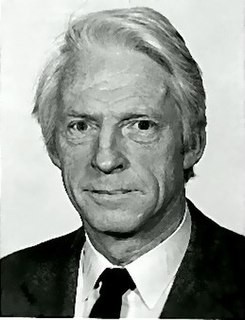Related Research Articles

The Medical Research Council (MRC) is responsible for co-coordinating and funding medical research in the United Kingdom. It is part of United Kingdom Research and Innovation (UKRI), which came into operation 1 April 2018, and brings together the UK's seven research councils, Innovate UK and Research England. UK Research and Innovation is answerable to, although politically independent from, the Department for Business, Energy and Industrial Strategy.
Janet Howard Darbyshire, CBE FMedSci is a British epidemiologist and science administrator.
Sir David Keith Peters is a retired Welsh physician and academic. He was Regius Professor of Physic at the University of Cambridge from 1987 to 2005, where he was also head of the School of Clinical Medicine.
The Institute of Occupational Medicine (IOM) was founded in 1969 by the National Coal Board (NCB) as an independent charity in the UK and retains this charitable purpose and status today. The "Institute" has a subsidiary, IOM Consulting Limited, which became fully independent in 1990 and now celebrates its 25th year within the IOM Group as an independent consultancy and also the commercial part of the IOM organization. It specializes in asbestos surveys and services, occupational hygiene services, nanotechnology safety, laboratory analysis and expert witness consulting services. IOM is therefore one of the UK's major independent "not for profit" centres of scientific excellence in the fields of environmental health, occupational hygiene and occupational safety. Its mission is to benefit those at work and in the community by providing quality research, consultancy, surveys, analysis and training and by maintaining an independent, impartial position as an international centre of excellence.
Paul James Lioy was a United States environmental health scientist born in Passaic, New Jersey, working in the field of exposure science. He was one of the world's leading experts in personal exposure to toxins. He published in the areas of air pollution, airborne and deposited particles, Homeland Security, and Hazardous Wastes. Lioy was a Professor and Division Director at the Department of Environmental and Occupational Health, Rutgers University - School of Public Health. Until 30 June 2015 he was a Professor and Vice Chair of the Department of Environmental and Occupational Medicine, Rutgers University - Robert Wood Johnson Medical School. He was Deputy Director of Government Relations and Director of Exposure Science, at the Rutgers Environmental and Occupational Health Sciences Institute in Piscataway, New Jersey.

K. Srinath Reddy is the president of the Public Health Foundation of India and formerly headed the Department of Cardiology at All India Institute of Medical Sciences (AIIMS).
Sir Peter Stanley Harper was a British physician and academic who was University Research Professor (Emeritus) in Human Genetics at Cardiff University. His work focused on researching neurogenetics and has resulted in discoveries concerning muscular dystrophies and Huntington's disease. He was knighted in 2004 for services to medicine.
Ian Robert Young was a British medical physicist, known for his work in the field of magnetic resonance imaging (MRI).
Graham Leon Collingridge is a British neuroscientist and professor at the University of Toronto and at the University of Bristol. He is also a senior investigator at the Lunenfeld-Tanenbaum Research Institute, Mount Sinai Hospital in Toronto.
The Queen's Birthday Honours 1995 were appointments by some of the 16 Commonwealth realms to various orders and honours to recognise and reward good works by citizens of those countries. The Birthday Honours are awarded as part of the Queen's Official Birthday celebrations during the month of June.
Leslie Lars Iversen, was a British pharmacologist, known for his work on the neurochemistry of neurotransmission.
Sir Ian Alexander McGregor, was a Scottish malariologist.
John Bernard Lloyd Howell was a British physician.
Professor Thomas Wilson Meade, also known as Tom, is a British epidemiologist.
Owen Lyndon Wade (1921-2008) was a British medical researcher and academic, described by the Royal College of Physicians as "one of the founding fathers of clinical pharmacology and therapeutics in the UK".
Professor John Ashton Dodge CBE, FRCP, FRCPE, FRCPI, FRCPCH, DCH is a retired British paediatrician, specialising in cystic fibrosis.

Professor Robert Lewis Maynard CBE, FRCP, FRCPath, FFOM is a British toxicologist.
Professor Michael Francis Oliver CBE, FRCP, FRSE (1925–2015) was a 20th-century British cardiologist who served as President of the Royal College of Physicians of Edinburgh for the period 1985 to 1988. He made major advances in identifying the causes of heart disease.
Sir Alasdair Muir Breckenridge, was a Scottish pharmacologist.

Philip Hugh-Jones FRCP was a British respiratory physician and Medical Research Council (MRC) researcher who during the Second World War investigated the effects of gun fumes on tank operators in Dorset and the effect of coal dust on Welsh coal miners with particular relevance to pneumoconiosis. This work led to future post-war pioneering research in lung physiology, the effect of asbestos on the lungs and lung diseases including emphysema.
References
- 1 2 3 4 5 6 7 8 Andy Ness; Lois Reynolds; Tilli Tansey, eds. (2002). Population-based Research in South Wales: The MRC Pneumoconiosis Research Unit and the MRC Epidemiology Unit. Wellcome Witnesses to Contemporary Medicine. History of Modern Biomedicine Research Group. ISBN 978-0-85484-081-6. Wikidata Q29581659.
- ↑ "Professor Anthony Seaton". The Institute of Applied Health Sciences. Retrieved 14 July 2013.CS1 maint: discouraged parameter (link)
- ↑ "New Year Honours List". Times Higher Education Supplement. 6 January 1997. Retrieved 6 May 2014.CS1 maint: discouraged parameter (link)
- ↑